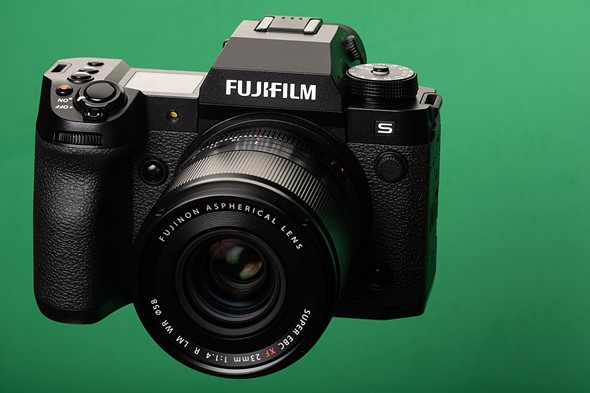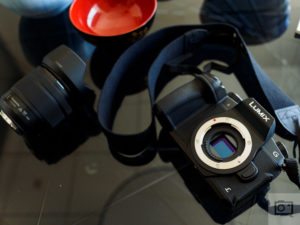
The rubber on older cameras can sometimes "revert," turning tacky or even liquefying, after many many years. When buying a new or especially used camera, it's easy to wonder: how many years will I get out of this? While many consumers expect to replace their phones every few years, it's not unusual for photographers to see their cameras as a long-term investment.
As for how long term, there are a variety of factors involved. In this article, we'll cover some of the things that can lead to a camera expiring and how long they take to manifest.
The short answer: it depends
Unfortunately, there's not one exact answer on how long a given camera will survive. We'll be discussing some average lifespans of various components in this article, but it's worth keeping in mind that those are just averages; some copies will die well before those milestones, and some will last long after. Two cameras built with the exact same parts on the exact same day may have drastically different lifespans.
The way you use a camera will have an impact on its lifetime
It's also worth noting that the way you use a camera will have an impact on its lifetime. Photographers who only shoot in climate-controlled buildings can expect their gear to last longer than someone who chucks theirs in a backpack and heads into the wilderness, subjecting it to a blazing sun and constant sand. Likewise, someone who takes thousands of photos a day will need to buy a new camera more often than someone who only occasionally takes pictures.
With that out of the way, let's take a look at some of the most common points of failure and around how long you can expect them to last.
Mechanical shutters: moving parts don't last forever
Many (though not all) cameras use a mechanical shutter to start and/or stop the process of exposing the sensor to light. These are small, complicated parts that move very quickly, which isn't a great formula for something that you want to last forever.
The shutter mechanism is one of the most complex mechanical parts in your camera.
Photo: Mitchell Clark
While most manufacturers don't provide an estimate for how long the shutter of every camera will last, it's not uncommon for them to provide ratings on their higher-end models. For example, Panasonic rates the S1RII's shutter for 400,000 actuations, while Canon rates the 1DX III's for 500,000.
Again, these are just averages – any particular camera may not reach that number, or it may vastly exceed it – but they provide an upper limit to how many photos you can expect to take with a camera before you have to worry about the shutter breaking. It's also worth noting that lower-end cameras likely have less robust mechanisms with no particular rating, so the manufacturer probably won't fix them under warranty if they break before what feels like their time.
While most cameras can operate in e-shutter only mode, your mechanical shutter breaking is probably a good sign that it may be time to start looking for a new camera.
Other moving parts
If you have other moving parts on your camera, such as an articulating screen, or port covers, those could also eventually wear out after repeated use. Again, if you treat them kinder, you'll generally get more out of them, but even with the gentlest touch ribbon cables that connect electronic components like displays will eventually wear out after flexing enough times.
If you tilt a screen back and forth enough times, the hinge or the ribbon cable (or both) will likely give up.
The same is true for ports. Some ports are more fragile than others – we're looking at you microHDMI – but if you plug and unplug something enough times, it can eventually wear out, making the connection less stable, or having it the port fail altogether. USB-C, for example, is rated to last for around 10,000 insertions.
Neither do electronics
Many photographers won't take hundreds of thousands of photos with their camera, but even the stationary parts have an expiration date. While there have been improvements in electronic components' longevity, they don't necessarily last forever. Given how complicated they are, even one component in your camera failing could spell game over for it.
In most cases, though, even components with limited lifespans like capacitors and solder joints can last for a decade or two, depending on how they're designed. However, it's something worth considering if you're looking to purchase a much older used camera. *
* - This warning brought to you buy the author's now-expired Nikon F3, which has some sort of electronics failure.
New batteries can be a new lease on life
If you have an older camera and it's starting to behave oddly, it may be worth trying a new battery in it if you can get your hands on one. You're probably aware that the lithium-ion batteries that are common in cameras will lose capacity as they're charged, drained, and recharged, but as they near the end of their life, they can also fail to provide the voltages the camera expects under some scenarios. This could lead to it seeming like your camera is broken when the issue is really that it's not getting the power it requires.
Physical life versus useful life?
It's okay to outgrow a camera that still has life left in it.
Photo: Dale Baskin
It probably goes without saying, but just because a camera is still kicking doesn't mean it still meets your needs. For some, it can be easy to fall into the mindset of "well, I can't get rid of a perfectly functional camera," even when more recent models may be much better-suited to their needs.
If you find that your gear is holding you back in some way – perhaps the autofocus isn't keeping up with your prefered subjects, or the sensor doesn't quite have enough dynamic range or resolution – it may be worth selling or donating it to someone whose needs it will meet, and looking for a camera that's better suited to you.
In summary: don't worry (too much) about it
If you're buying a camera from a reputable brand, the odds are good that it won't just fall apart during its natural life; we'd expect most cameras to last between 10-20 years before their construction really starts to become a concern. After that, you may need to start thinking about the lifespan of their electronics, plastics and the complicated mechanisms that make them work.
The main factor in how long your camera lasts will be how you treat it. If you take care of your camera it should serve you well for a long time. . . or at least until you get the itch to upgrade.
. dpreview.com2025-7-29 16:30






















